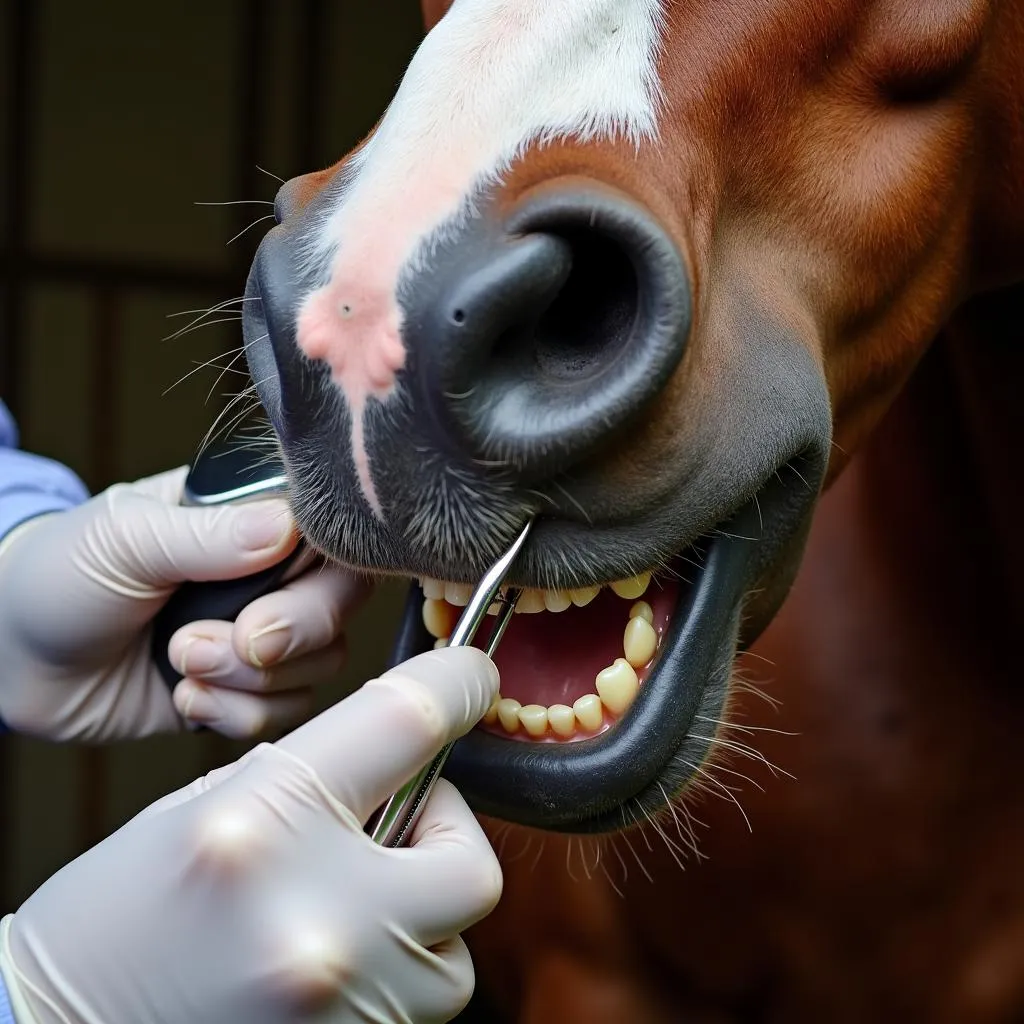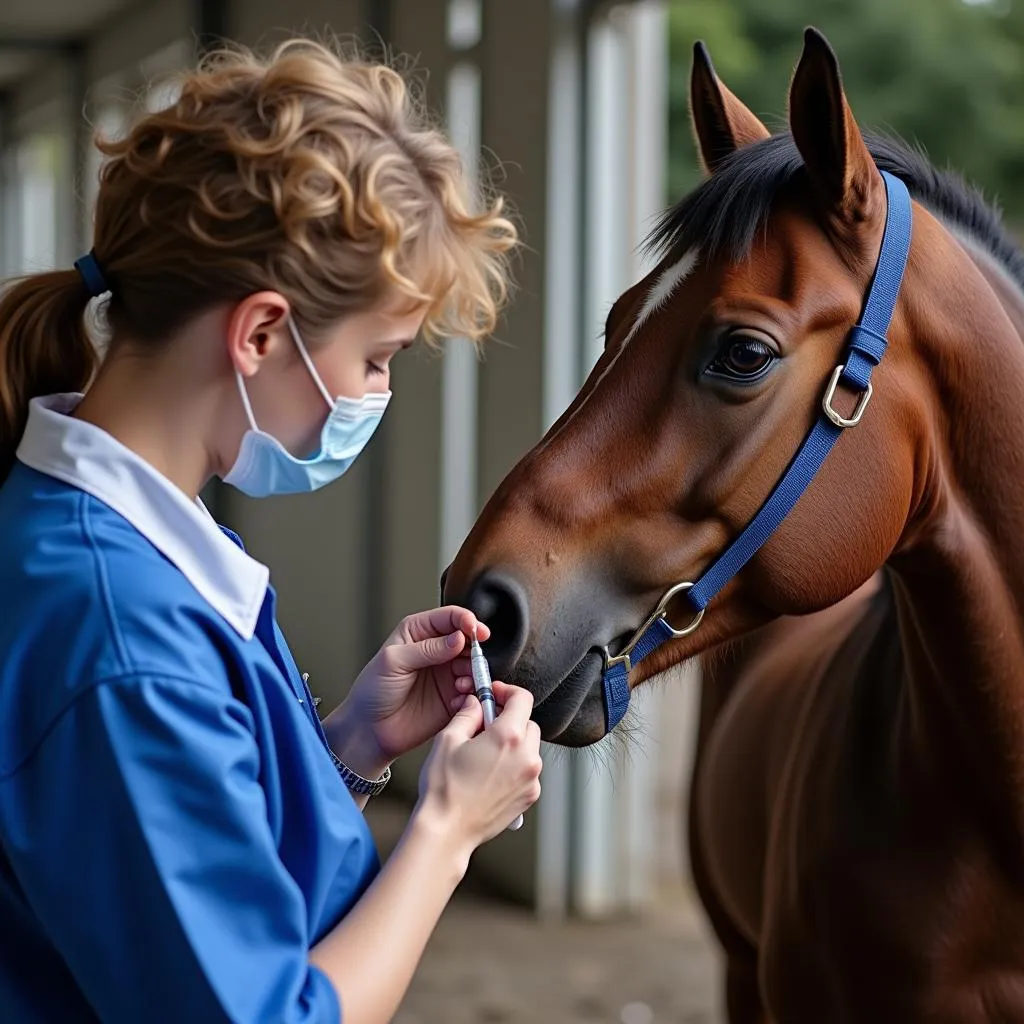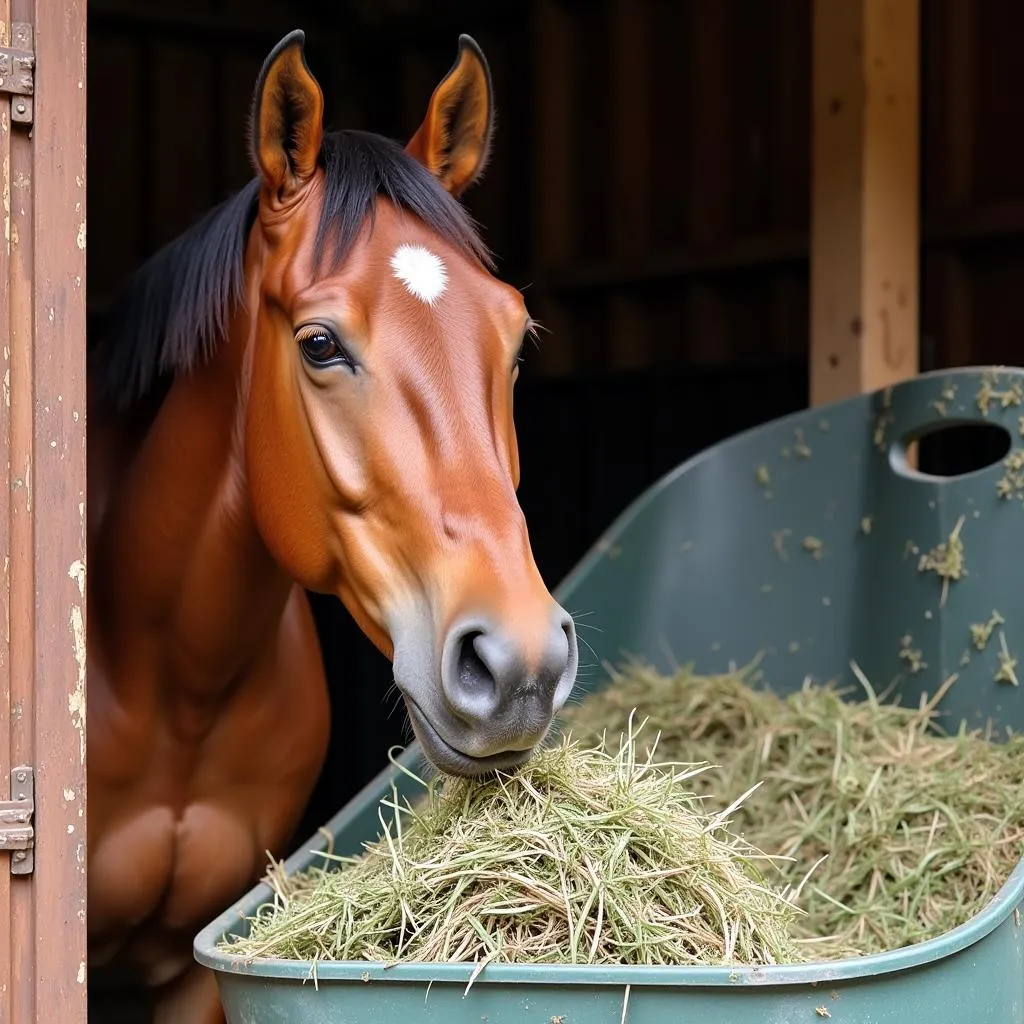Horse Appetite Stimulants are a topic that often sparks curiosity and concern among horse owners. While a healthy horse usually displays a hearty appetite, there are instances when their desire to eat diminishes, signaling a potential underlying issue. Understanding the causes behind a decreased appetite and knowing when it’s appropriate to consider an appetite stimulant is essential for any horse owner.
Recognizing the Signs of a Poor Appetite in Horses
Horses are naturally grazing animals, spending a significant portion of their day eating. A sudden or gradual decrease in food intake can be a warning sign that something is amiss. Here are some common indicators of a poor appetite in horses:
- Reduced Hay Consumption: A significant decrease in the amount of hay your horse typically eats.
- Leaving Grain Uneaten: Ignoring or partially consuming their grain ration, which may indicate a more serious problem.
- Lack of Interest in Treats: Showing disinterest in treats they usually enjoy.
- Lethargy and Depression: A decrease in energy levels and overall enthusiasm.
- Weight Loss: Noticeable loss of weight or a change in body condition.
Potential Causes of Reduced Appetite in Horses
Identifying the reason behind your horse’s diminished appetite is crucial for effective treatment. Several factors can contribute to a loss of appetite in horses, ranging from mild and temporary to more serious medical conditions.
Dental Problems:
Dental issues, such as sharp enamel points, tooth root infections, or loose teeth, can cause significant pain while chewing, making eating uncomfortable and discouraging your horse from consuming food properly.
 Veterinarian Performing a Horse Dental Exam
Veterinarian Performing a Horse Dental Exam
Stress and Environmental Changes:
Just like humans, horses can experience stress and anxiety, leading to a decrease in appetite. Changes in routine, travel, new surroundings, or the introduction of a new horse to the herd can all contribute to stress-induced appetite loss.
Illness and Infection:
Various illnesses and infections, such as colic, respiratory infections, or systemic diseases, can suppress a horse’s appetite. Fever and pain often accompany these conditions, further reducing their desire to eat.
Medications and Treatments:
Certain medications, such as antibiotics or non-steroidal anti-inflammatory drugs (NSAIDs), can have side effects that affect a horse’s appetite. It’s essential to discuss potential side effects with your veterinarian when starting your horse on any new medications.
 Veterinarian Giving Medicine to a Horse
Veterinarian Giving Medicine to a Horse
Gastric Ulcers:
Gastric ulcers, open sores in the lining of the stomach, can cause discomfort and pain, particularly after eating, leading to a decrease in appetite.
Horse Appetite Stimulants: What Are They?
Horse appetite stimulants are specifically formulated supplements designed to encourage horses to eat. They work by stimulating the appetite centers in the brain or by addressing underlying issues that may be contributing to the decreased food intake.
Types of Horse Appetite Stimulants:
Several types of horse appetite stimulants are available, each with its own mechanism of action:
-
B Vitamins: B vitamins, particularly B1 (Thiamine) and B12 (Cobalamin), play a vital role in energy metabolism and nerve function, which can be compromised in horses with a poor appetite. Supplementing with B vitamins can help improve their overall well-being and encourage them to eat.
-
Probiotics: Probiotics are beneficial bacteria that support a healthy digestive system. Imbalances in the gut microbiome can contribute to appetite loss, and probiotics can help restore this balance, promoting a healthy appetite.
-
Herbal Supplements: Certain herbs, such as chamomile, ginger, and peppermint, are believed to have appetite-stimulating properties and can be beneficial for horses experiencing mild and temporary appetite loss.
-
Prescription Appetite Stimulants: In cases where underlying medical conditions are contributing to the loss of appetite, your veterinarian may prescribe medication specifically designed to stimulate appetite and address the underlying issue.
When to Consider an Appetite Stimulant
Deciding when to use an appetite stimulant for your horse should always involve consultation with your veterinarian. They can help determine the underlying cause of the reduced appetite and recommend the most appropriate course of action.
Situations where your veterinarian may recommend an appetite stimulant:
- Recovery from Illness or Surgery: To encourage eating and support the healing process.
- Dental Procedures: To ease discomfort and encourage eating after dental work.
- Stressful Situations: To help manage stress-induced appetite loss.
- Underlying Medical Conditions: To address appetite loss associated with specific health issues.
Using Horse Appetite Stimulants Safely and Effectively
While appetite stimulants can be beneficial in certain situations, it’s crucial to use them responsibly and under the guidance of your veterinarian.
-
Follow Dosage Instructions: Always administer the recommended dosage provided by your veterinarian or on the product label.
-
Monitor for Side Effects: Be observant for any adverse reactions, such as digestive upset or behavioral changes, and consult your veterinarian if you notice any unusual symptoms.
-
Address the Underlying Cause: Remember that appetite stimulants are not a cure-all solution. It’s crucial to identify and address the underlying cause of the appetite loss to ensure your horse’s long-term health and well-being.
 Healthy Horse Enjoying Hay
Healthy Horse Enjoying Hay
Conclusion
A horse’s appetite is a valuable indicator of their overall health and well-being. While occasional fluctuations in appetite are normal, persistent or significant decreases in food intake warrant attention. By understanding the potential causes of a reduced appetite and knowing when to consider horse appetite stimulants, you can play a proactive role in ensuring your equine companion receives the care they need to thrive. Remember, consulting with your veterinarian is crucial for diagnosing and addressing any underlying health issues and determining the appropriate use of appetite stimulants.
FAQs about Horse Appetite Stimulants
1. Are horse appetite stimulants safe for long-term use?
The safety of long-term use depends on the specific type of appetite stimulant and the underlying reason for its use. It’s best to consult with your veterinarian regarding the duration of treatment and potential risks.
2. Can I give my horse appetite stimulants if I suspect colic?
No, it’s crucial to avoid giving any medications or supplements if you suspect colic. Contact your veterinarian immediately as colic is a serious condition that requires prompt veterinary attention.
3. How long does it take for a horse appetite stimulant to work?
The onset of action varies depending on the type of stimulant used. Some may show results within a few hours, while others may take several days to produce noticeable effects.
4. Can I use human appetite stimulants on my horse?
No, never administer human medications or supplements to your horse without consulting your veterinarian. Horses metabolize drugs differently than humans, and what’s safe for humans can be toxic to horses.
5. What are some natural ways to stimulate a horse’s appetite?
Offering fresh, appealing forage, ensuring access to clean water, providing a stress-free environment, and adding flavor enhancers like apple cider vinegar to their feed can naturally encourage a horse to eat.
Need more help with your horse? Contact us at Phone Number: 0772127271, Email: [email protected] Or visit us at: QGM2+WX2, Vị Trung, Vị Thuỷ, Hậu Giang, Việt Nam. We have a 24/7 customer service team.